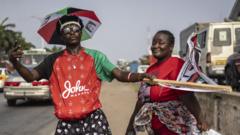John Mahama faces immense pressure to fulfill the promises made during his election campaign amid economic challenges in Ghana. With citizens hoping for rapid improvements in the economy and anti-corruption measures, Mahama's administration will have to confront skepticism and deliver tangible results to regain public trust.
Ghana’s Challenges Ahead: Can Mahama Deliver on Voter Promises?

Ghana’s Challenges Ahead: Can Mahama Deliver on Voter Promises?
As former President John Mahama resumes office facing economic turmoil, Ghanaians hold high hopes for effective leadership.
As Ghana welcomes its newly elected president, John Mahama, the former leader faces a daunting responsibility to align with the high expectations of voters who have endured significant economic hardships in recent years. After reclaiming power with a decisive victory over Vice-President Mahamudu Bawumia, Mahama secured 56.6% of the votes, marking a significant political comeback after eight years in opposition.
His party, the National Democratic Congress (NDC), also gained a substantial parliamentary presence, holding 183 out of 276 seats. However, despite this majority, they fall just short of the two-thirds necessary to autonomously pass legislation or approve budgets, creating an imperative for negotiation and collaboration across party lines. The upcoming weeks will be critical, especially as preliminary results remain contested in a few parliamentary cases.
Voter engagement was notably lower than in the previous election, signaling potential disenchantment among supporters of Bawumia's New Patriotic Party (NPP). During celebrations, many Ghanaians expressed aspirations for swift changes, particularly in alleviating the economic distress characterized by increased living costs and unemployment. This sentiment was echoed by Belinda Amuzu, a teacher from Tamale, who voiced hoped-for reforms against corruption and improved economic conditions.
The outgoing administration, led by President Nana Akufo Addo, claims to have improved the economy, citing nearly $8 billion in gross reserves compared to the inherited $6.2 billion in 2017. Nevertheless, opposition legislators dismiss this narrative, emphasizing widespread despair characterized by high debt and joblessness.
Experts like Ghanaian economist Prof. Godfred Bokpin stress the necessity of competent governance and efficient public service for the nation’s recovery. Mahama has pledged to reduce cabinet size as part of his reform strategy, a move some argue should go further for a more streamlined government. Alongside Mahama, Naana Jane Opoku-Agyemang, preparing to become the nation's first female vice-president, is seen as a hopeful change for governance.
Mahama's campaign promised job creation and easing the cost of living, with ambitious plans like promoting nighttime economies and reducing specific taxes that burden the populace. However, doubt lingers, as the former president's previous term was marred by economic crises and power shortages, leading to the nickname "Mr. Dumsor," referring to persistent power outages.
Yet, Mahama remains confident in his ability to navigate challenges, suggesting a renegotiation of IMF loan terms to prioritize social programs essential for the 7.3 million Ghanaians living in poverty. Analysts indicate that economic transformation may take years, and failure to deliver could result in public backlash similar to that faced by the NPP.
Addressing the pervasive issue of corruption, Mahama promises rigorous investigations into past misconduct by officials, including the controversial procurement processes of the prior government. He aims to establish accountability structures to regain public trust.
The expectations placed upon Mahama are exceptionally high, a reality he acknowledged in his victory speech. The roadmap he sets forth will not only define his presidency but also impact public perception, as Ghanaians are poised to respond to the efficacy of his administration in meeting their urgent needs. The stakes are high, and the next steps will be crucial for the future of Ghana.
As Mahama prepares to resume the presidency, all eyes will be on his government to see if it can effectively confront the pressing issues and emerge as a transformative force for the nation.





















